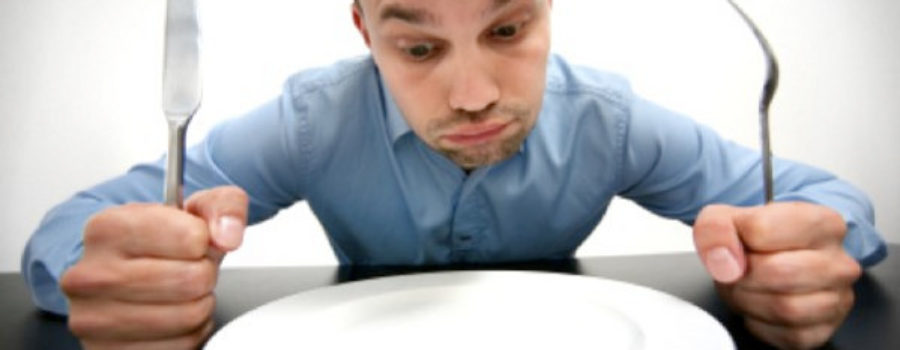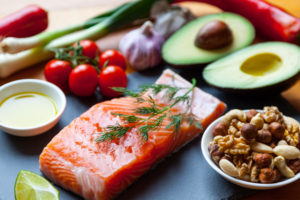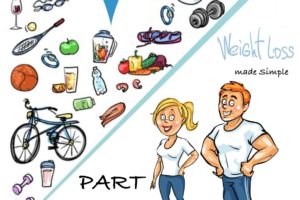“Hunger is not an emergency!” – Dr. Judith Beck
Whenever you embark on a fat loss program, remember that hunger is normal. You should expect hunger, realise it’s a natural biological reaction to a calorie deficit and that you need to tolerate it. If you didn’t ever feel hungry during the program, your body wouldn’t be burning fat so it’s unrealistic to expect no hunger at all. But there are ways on how to reduce hunger.
Hunger is the natural biological response every time you deprive yourself of calories. This occurs due to the hormones leptin (secreted by your fat cells) and Ghrelin, CCK, Neuropeptide YY and others (secreted by your stomach and gastrointestinal tract).
When these hormones are released, they interact with your central nervous system (which is your brain and hypothalamus) and tells it to simply turn up the appetite dial just a little notch. As your intake of calories go down, your appetite goes up, and you start thinking about food!
This is yet another reason why slow and steady wins in the end. Here at George Health, my clients enjoy a patient, gradual approach to fat loss. This conservative calorie deficit means their weight loss is slower, but it means less hunger, and much less chance of bingeing and a chance of relapse.
For those out there that want to sign up to a “rapid weight loss program”, then feel free to do so. However, make sure you understand that it will involve a crazy urge and tendency towards hunger, cravings, emotional eating and bingeing, and believe me that is the worst thing you could do.
Very very few people actually have the willpower and dietary restraint to bear the grind of hunger and so they manage to lose weight more quickly. But in the end, hunger, cravings and “wanting those favourite foods” gets the best of everyone, and as soon as that crazy diet ends, the overeating and bingeing soon puts the weight back on.
Science has proven it. Examples include research from Oxford University and the National Weight Control Registry that says that 80-95% of all dieters gain back all the weight they lost. At the heart of it, uncontrolled hunger the reason why.
My clients are given strategies on how to reduce hunger and handle and control their cravings. Remember that we are dealing with both a physical and mental challenge, and so these strategies need to be both mental and physical. Even the most powerful appetite suppressants in the industry won’t help at all if there is no mental strength, and even if you have the strongest willpower in the world, it won’t last you forever in the face of biological hunger.
I won’t binge after my crash diet. No way! Yeah, that’s what they all say! We are all susceptible and nine out of ten of us who complete their body transformation will start to pig out the very instant that their “after” photo is taken. I’ve seen leading national champion bodybuilders, gorge themselves that night after a their competition has ended. They eat as if it were the last meal they would ever get! These people are the ones with crazy will power and should know better in the first place.
First, let me give you two quick mental shifts in attitude and mind set that will put everything else you do into a better perspective.
As stated by cognitive psychologist Judith Beck, “hunger is not an emergency.” When we stop and think about that, yeah you’re right, it’s true!
Whenever you feel the slightest twinge of peckish huger, our brain is conditioned to stop everything and start looking for the nearest convenient source of food (this is why my clients plan ahead and prepare meals and options in advance).
Do we really NEED to eat though? Will anything bad happen if we don’t immediately eat as soon as we feel hungry? What will happen instead? We will be burning fat, getting leaner, slimmer, tighter, better looking, reveal our abs!
So what does hunger really mean then? What is happening when I’m hungry? Hunger is the feeling of fat cells shrinking. I expect feel hungry when I’m burning fat. It means you are getting leaner. It means the you are progressing towards your goals and you are right on track to achieve them!
At the same time, you should NOT be feeling like you’re starving or ravenous for food. If you are, then there may be some nutrition issues you need to think about and you also need to use some physical strategies to learn so you know how to reduce hunger as much as possible.
Even if you were this professional Olympian athlete or had the willpower of a monk, you still wouldn’t be able to resist the temptations of the modern world by being surrounded by food and eating advertising when you are in constant and severe hunger on a rapid crash diet. When that happens, food becomes the only thing in your life that you care about.
So here are my top ten simple ways to reduce your hunger and make fat loss easier for my clients.
1. Experiment with different meal frequency and timing options. The actual number and timing of meals best for you to consume is dependant on your calorie budget, size, gender, genetics, lifestyle and personal preferences. Here for a link to a section on “MEAL TIMING”, where I provide you three different options to choose from, and include some specific suggestions for you based on modern science and best practices.
2. Combine as many meals as you can with a good lean source of protein. Protein is a macronutrient king when it comes to hunger suppression and it controls appetite far far better than fat or carbohydrates does. This is shown in an excellent study from the University of Washington School of Medicine in Seattle who found that swapping out a small amount of carbs and replacing it with lean protein (changing from 15% protein to 30% protein) improved weight loss. This is due to an increase in leptin sensitivity and a reduction in appetite. Top tip, casein protein is available as a protein powder supplement and is a slower releasing source of protein. Maastricht University in the Netherlands did a study that reported having casein protein makes you feel fuller compared to whey protein powder.
3. Eat enough fat in your day. Fat is not the enemy, so my clients enjoy the right amount of fat in their nutrition plans. Some fitness coaches promote a very low fat diet and it will always lead to unnecessary additional hunger. Remember that dietary fats don’t reduce hunger as well as lean protein, but they do play a part in slowing down the gastric emptying of your digestive system, and also help regulate our blood sugar levels by providing a mixed meal that is not all carbs. Dietary fat is excellent at providing psychological satiety and satisfaction, due to its added flavour and texture in your meal.
4. Make sure you eat 14 grams of fibre for every thousand calories of caloric you eat. Fibre is filling and satisfying and provides volume and bulk to your daily meals without the extra calories. Choose your vegetables first, then fruits second, and finally high fibre whole grains, legumes and root veggies. This equates to around 25-35 grams a day for most people. This is shown in a relatively new study by the University of Kentucky, who provided a customised recommendation for fibre. They recommend 14 grams per 1000 calories per day energy expenditure. For a female at 2000 calories, that would be around 28 grams fibre each day, and for a male at 2700 calories per day, that would be 38 grams of fibre.
5. Drink more water and drink when you first feel hungry. I bet you’ve heard it before, “remember, you think you’re hungry but you’re really just thirsty mate”. I’ll say now that water isn’t necessarily an appetite suppressant per say, but it does take up space in your stomach. If you have a zero calorie drink when you feel hungry, that may also give you a bit of mental help to make you think you’re fuller. Examples of drinks you can have include tea or coffee (without the cream or sugar). I use sparkling water (and sometimes a small can of diet soda) because I feel the carbonation makes me feel fuller, at least for a little while until my next meal. You could also try a splash of lemon or lime juice in your water as it’s a low-calorie alternative to diet soda. Yes I know that we don’t like artificial sweeteners found in diet soda or diet drinks, but it can be useful if consumed in controlled occasional moderation.
6. Try out different types of food and see what makes you feel fuller in your own body. Everyone is different in this regard, but in all cases people have found that some foods make you feel much fuller than others. For example, some of my clients say say oatmeal makes them extremely full, and a boxed processed cereal like wheat flakes leaves them hungry. I agree! I find that keeping processed carbs down in the morning and enjoying lean proteins mostly for breakfast (like eggs or a protein shake) will make hunger much less during the rest of the day. Ultimately, everyone will have their own foods that work for them and you just need to do a little experimentation in your own time. My clients keep a journal to help us work together and find foods that work for them. We discuss the hunger levels and how they feel immediately after their meals.
7. Doing a workout and training! It’s strange that different exercises can either increase or decrease your appetite. When I look at the majority of research, it says that it decreases appetite, or helps psychologically to improve compliance to a diet, but there are exceptions. For example, have you found that swimming increases your hunger? It does for me! I get out of the pool and I’m starving! At the same time, I find that my fasted morning cardio sometimes reduces my appetite. Just make sure that you don’t waste all your efforts of training by eating more after any kind of exercise just because you feel like you’ve earned the extra food if you worked out. If you do, you’ll just end up putting back all or more of the calories you burned in the first place. My clients are more likely to stay on their nutrition program when they exercise because they feel like eating extra would undo all the good they did from training (their training can be a motivator to stay on their diet).
Still not working? I could be more to do with mental blocks and emotional hunger. Here is an article that might help on not holding yourself back.
Before I go, I want to talk quickly about appetite suppressants. I am not wanting to promote any appetite drugs out there, but I have to admit that some exist which may work, including over the counter drugs. However, you should consider pharmaceuticals a last resort.
There are a few more techniques that my clients use to control hunger and keep it in check, but I’ll keep these trade secrets for now.
Check out a free video on how to handle hunger. Click and Subscribe today.
References:
Anderson JW, et al. Health benefits of dietary fiber, Nutr Rev. 2009 Apr;67(4):188-205. Dept of Internal Medicine and Nutritional Sciences, University of Kentucky.
Blundell JE, cross talk between physical activity and appetite control: does physical activity stimulate appetite? Proc Nutr Soc, 62, 651-661. 2003
Efthimia, Karra, The role of peptide YY in appetite regulation and obesity. The Journal of Physiology, dec 2008
King NA, effects of exercise on appetite control: Implications for energy balance. Med Sci Sport Exer, 29(8): 1076-1089. 1997
Farshchi HR, et al. Why Eating Breakfast Is Important for Optimising Human Metabolism? Iranian Journal of Public Health. 2005;34(Sup) : 72-73
Gilhooly, CH. Food cravings and energy regulation: the characteristics of craved foods and their relationship with eating behaviors and weight change during 6 months of dietary energy restriction. Int J Obes. 2007 Dec;31(12):1849-58. USDA Human Nutrition Research Center on Aging at Tufts University, Boston, MA
Hetheringon NM, Cameron F. et al. Stimulation of appetite by alcohol. Physiol Behav. 74(3): 283-289. 2001. University of Dundee, Scotland
Johnstone AM. High-protein diets for appetite control and weight loss – the ‘holy grail’ of dieting? Br J Nutr. 2009 Feb 19:1-2.
Mourao DM, Bressan J, Campbell WW, Mattes RD. Effects of food form on appetite and energy intake in lean and obese young adults. International Journal of Obesity. 2007 Nov;31(11):1688-95. Purdue University, West Lafayette, IN
Nedeltcheva AV, et al. Sleep curtailment is accompanied by increased intake of calories from snacks. Am J Clin Nutr. 2008 Dec 3.Department of Medicine, The University of Chicago, Chicago, IL, and Nutritional Sciences, University of Wisconsin, Madison, WI.
Speechly DP, Rogers GG, Buffenstein R. Acute appetite reduction associated with an increased frequency of eating in obese males. Int J Obes Relat Metab Disord. 1999 Nov;23(11):1151-9. University of Witwatersrand Medical School, Johannesburg, South Africa
Speechly DP, Buffenstein R. Greater appetite control associated with an increased frequency of eating in lean males.Appetite 1999; 33:285-97. University of Witwatersrand Medical School, Johannesburg, South Africa
Timlin MT, Pereira MA. Breakfast frequency and quality in the etiology of adult obesity and chronic diseases. Nutr Rev. 2007 Jun;65(6 Pt 1):268-81.Division of Epidemiology and Community Health, University of Minnesota, Minneapolis.
Weigle, et al. A high protein diet induces sustained reductions in appetite, ad libitum caloric intake, and body weight despite compensatory changes in diurnal plasma leptin and ghrelin concentrations. American Journal Of Clinical Nutrition. 2005 82: 41-48. University of Washington School of Medicine, Seattle, WA.
Wells, T. Ghrelin – Defender of fat. Prog Lipid Res. 2009 May 3. Epub ahead of print. School of biosciences, Cardiff University, UK
Veldhorst MA, et al. Comparison of the effects of a high- and normal-casein breakfast on satiety, ‘satiety’ hormones, plasma amino acids and subsequent energy intake. Br J Nutr. 2008 Jul 18:1-9. Maastricht University, The Netherlands.
Veldhorst M, Smeets A, et al. Protein-induced satiety: Effects and mechanisms of different proteins. Physiol Behav. 2008, Maastricht University, The Netherlands.






Leave a Reply